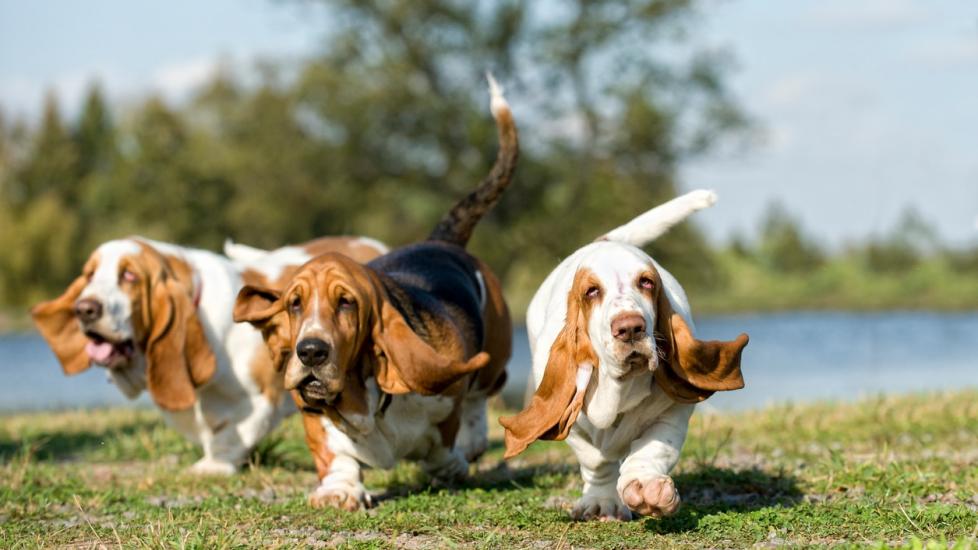Basset Hound
iStock/dageldog
The Basset Hound is a hound dog originally bred in France. Basset Hounds are descendants of the St. Hubert Hound, a now-extinct breed that resembled modern-day Bloodhounds.
Bred to hunt rabbits and hares, Basset Hounds are short and sturdy dogs, standing no more than 15 inches tall and weighing 40–65 pounds. Their low-to-the-ground stature is where the breed takes their name: basset is French for “short” or “low-set.”
Caring for the Basset Hound
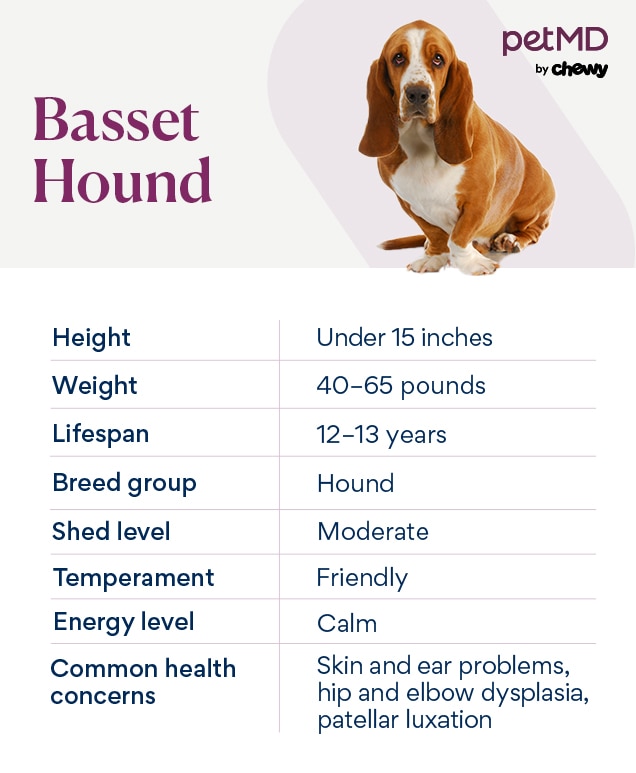
Basset Hounds are generally good-natured and friendly dogs. They’re easily recognizable not only because of their short legs, but also due to their short, smooth coat; droopy face, ears, and lips; wrinkly skin; and tendency to drool.
Though bred to hunt centuries ago, Basset Hounds are notoriously low-energy dogs and most commonly serve as companion pets today. They may need some encouragement to stay active and at a healthy weight. The Basset Hound Club of America (BHCA) recommends at least one walk every day.
Along with being a little lazy, typical Basset Hound characteristics include a loud, long bark; a strong nose that they may follow into trouble; and a short, sleek coat that doesn’t need much grooming but sheds regularly.
Basset Hound Health Issues
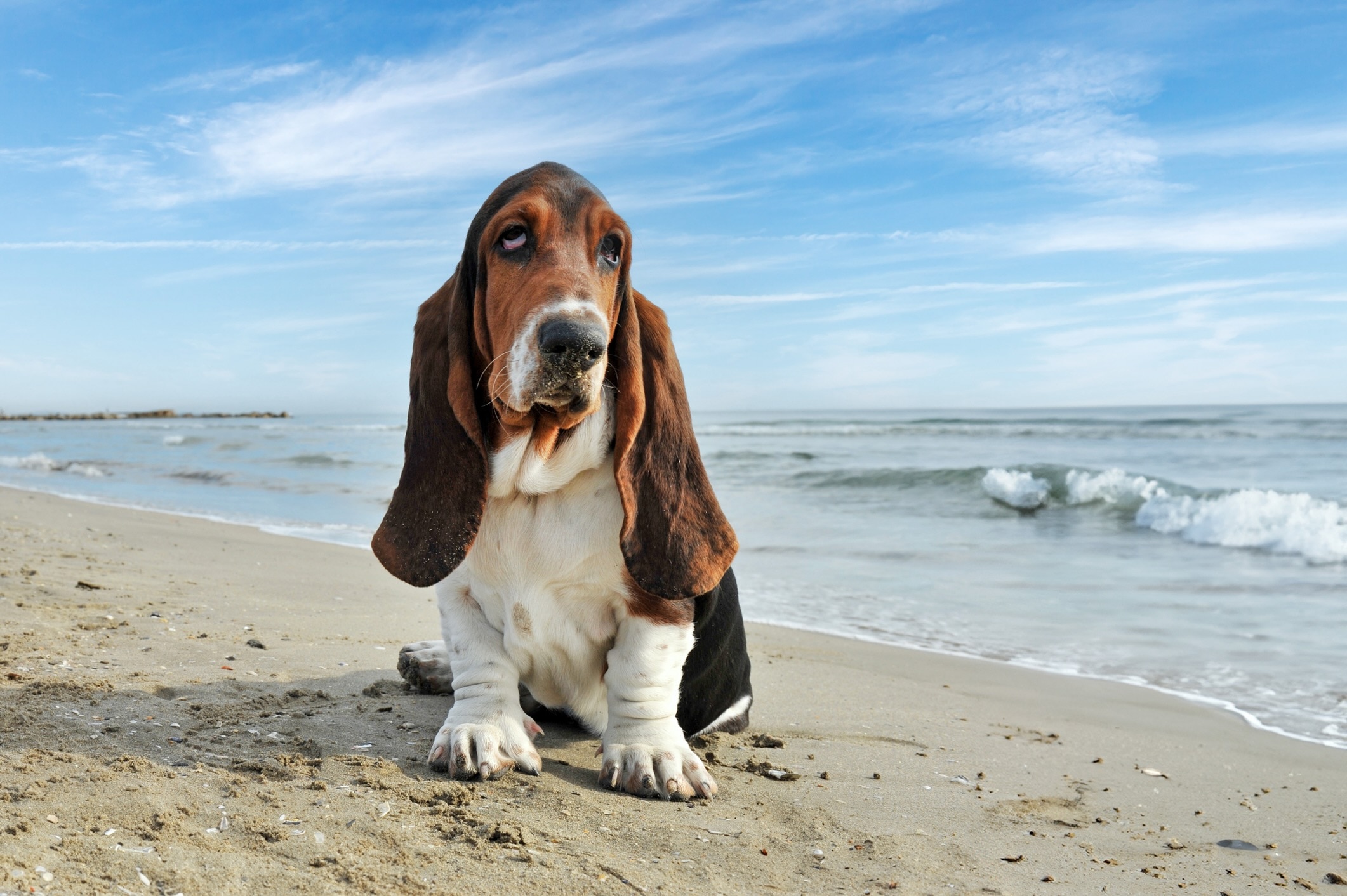
The average Basset Hound lifespan is 12–13 years, and the dogs are prone to skin, ear, and joint problems. However, with proper care and management, Basset Hound dogs can live healthy and happy lives.
Skin and Ear Problems
Basset Hounds are often prone to allergies and seborrhea. This may trigger ear infections or recurring skin infections. Bassets can also frequently develop bacterial and yeast infections, especially on their skin folds.
Skin and ear infections are painful to any dog. Scratching, skin rashes, head shaking, debris in the ears, or strong odors may indicate an infection. Contact your vet if you notice any of these symptoms in your Basset Hound.
Frequent bathing with a medicated shampoo and an after-bath ear cleaning helps prevent and manage infections. Your veterinarian may also recommend medications such as Apoquel or Cytopoint to help manage allergies and prevent inflammation.
Hip and Elbow Dysplasia
Basset Hounds have short and abnormally shaped legs, which make them prone to dysplasia.
-
Hip dysplasia is an abnormal development of the hip joint, resulting in a ball and socket joint that does not fit tightly together and is unstable.
-
Elbow dysplasia is when the elbow joint develops abnormally, resulting in elbows that are abnormally shaped. This can cause pain, limping, and lameness.
When left untreated, both conditions can lead to arthritis. Treatment depends on the severity of your dog’s joint condition and can involve joint supplements, weight management, anti-inflammatory medications, or even surgery.
Arthritis
Basset Hounds are especially prone to developing arthritis due to their prevalent joint issues. Basset Hounds also gain weight easily, which puts extra strain on their joints and worsens arthritis.
Talk to your veterinarian to learn how to best protect your dog’s joints. Your vet may recommend giving your dog a supplement to slow the progression of arthritis.
Regular exercise and measured meals are also important to keep your Basset healthy.
Patellar Luxation
Patellar luxation is a condition where the kneecap moves side-to-side out of position. It causes instability and sometimes pain in the knee joint. Signs of patellar luxation include a limp that comes and goes, a bowlegged posture, and a cracking or popping sound from the dog’s knee.
Many dog breeds are susceptible to patellar luxation, including Basset Hounds. Treatment ranges from pain medications and exercise restriction to weight loss to surgery, depending on the severity.
Intervertebral Disc Disease (IVDD)
IVDD affects dogs with long backs and short legs, such as the Basset Hound. It’s a condition that affects the spine, caused when the cushioning discs between bones in the spinal column become displaced. This can cause pain and paralysis.
Contact your vet immediately if your dog is having trouble getting around. Treatment for IVDD depends on the condition’s severity and ranges from medical management to emergency surgery.
Bloat and Gastric Dilatation-Volvulus (GDV)
Gastric dilatation-volvulus (GDV) is a severe form of bloat in dogs, when a dog’s stomach inflates with gas and food and then twists. This cuts off blood flow to the stomach and spleen, and it’s a life-threatening emergency.
Bloat and GDV often affect deep-chested breeds, such as the Basset Hound. Symptoms include:
-
Retching without vomiting anything up
-
Pacing
-
Excessive drooling
-
Distended abdomen
Take your Basset Hound to their vet or an emergency veterinarian immediately if you notice these symptoms. This condition is fatal if not treated quickly.
What To Feed a Basset Hound
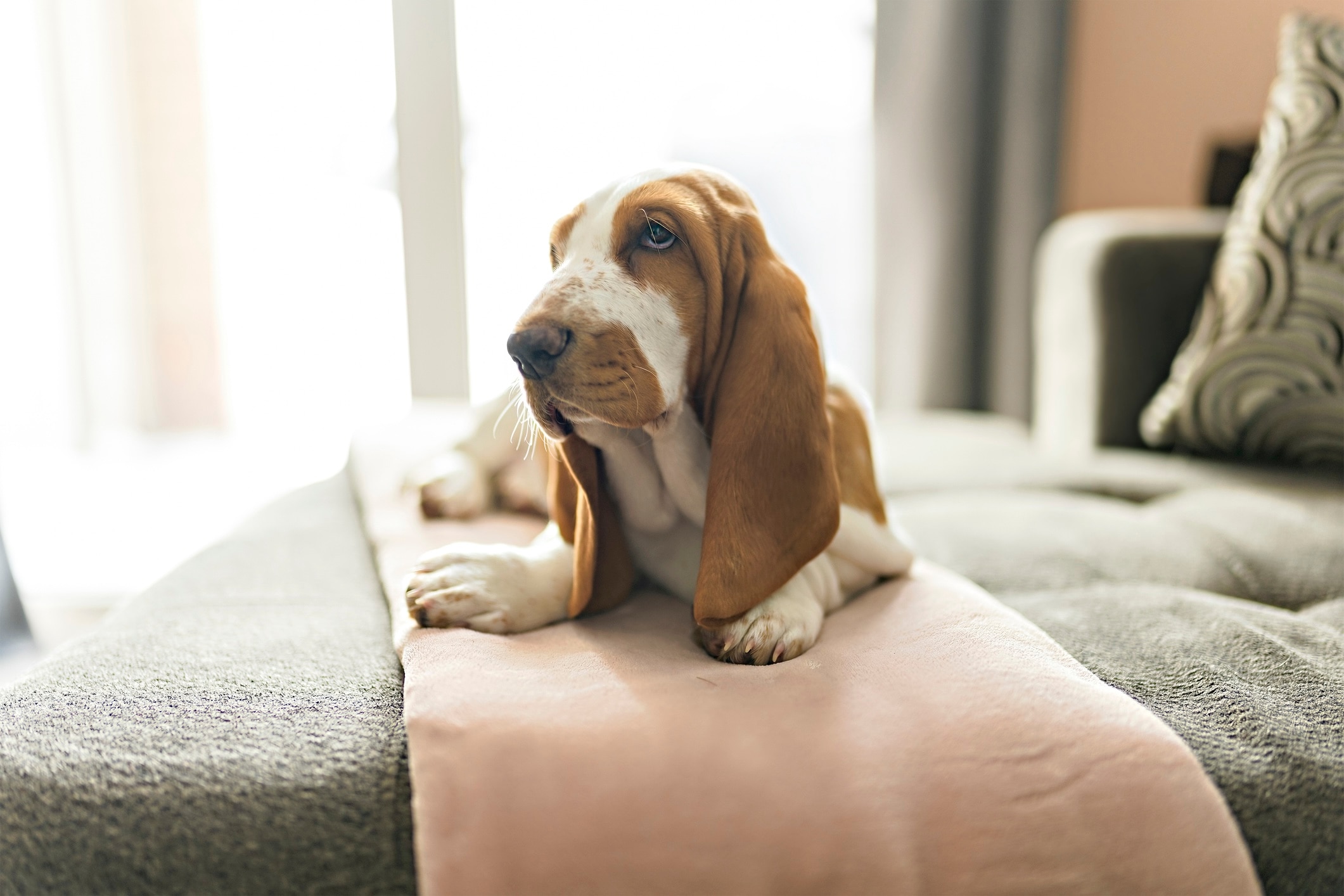
Basset Hounds are big dogs with short legs. Despite their height, they do best when fed a nutritionally complete and high-quality dog food.
The food must meet the nutritional standards for your dog’s current life stage, as determined by the Association of American Feed Control Officials (AAFCO). Food formulated for weight management helps prevent obesity and can prolong the lifespan of a Basset Hound dog.
Avoid giving your pet table scraps and human food, as these provide unnecessary calories and could even be dangerous to your dog.
How To Feed a Basset Hound
Adult Basset Hounds do well with two measured meals per day. Twice-daily feedings can help reduce the risk of bloat and GDV, and you can take additional steps to prevent this condition by:
-
Using a slow feeder bowl if your Basset tends to eat too quickly
-
Avoiding elevated food bowls, which may increase the chance of bloat
-
Restricting exercise right before or just after meals
-
Talking to your vet about whether a gastropexy procedure (where the stomach is tacked to prevent twisting) is a good option for your dog
Basset Hound puppies may need to eat up to four meals per day, so talk to your veterinarian to determine the best feeding schedule.
Remember that Basset Hounds have a strong sense of smell, so it’s important to keep food secured, sealed, and out of reach so they don’t help themselves to extra portions—and extra calories.
How Much To Feed a Basset Hound
Basset Hounds are prone to obesity due to their low energy. To keep your dog healthy, pay close attention to the recommended feeding amount on the food bag and use a measuring cup when feeding your dog.
Your vet can also give you personalized instructions on how much to feed your dog, based on your Basset Hound’s lifestyle, health, and other factors.
Nutritional Tips for a Basset Hound
Because joint problems and arthritis are common in Basset Hound dogs, your vet may recommend joint supplements or a joint health-focused diet. Basset Hounds may also benefit from omega-6 and omega-3 fatty acids (fish oil), which can help manage and prevent skin and ear inflammation.
Never give your dog a supplement without speaking to your vet first.
Behavior and Training Tips for Basset Hounds
Basset Hound Personality and Temperament
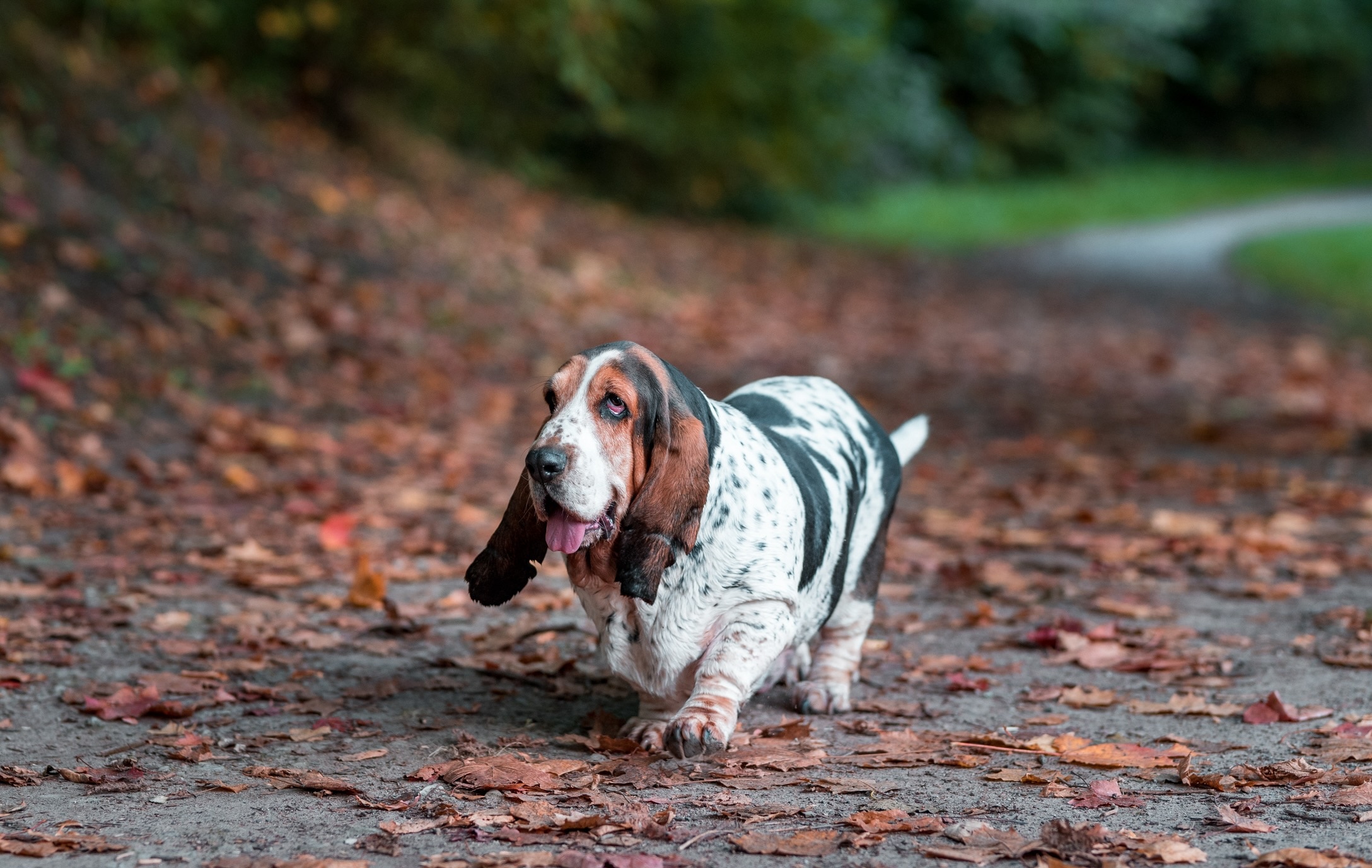
The Basset Hound is a good-natured and low-energy companion. They are generally affectionate and friendly with kids and other pets, especially with proper introductions, socialization, and supervision.
Though these calm dogs are likely happy to sleep in their dog bed all day long, pet parents must be diligent about exercising their Basset Hound to prevent obesity and other health issues.
As friendly dogs, some Basset Hounds don’t do well when left alone for long periods and can develop separation anxiety. Make sure your Basset has mental enrichment (such as toys) or company (such as another dog or a pet sitter) when you’re away from home for more than a few hours.
Basset Hound Behavior
Basset Hounds bark a lot. They have a very loud, baying bark, and they use it when they are excited or frustrated. You can reduce their barking through training, but don’t expect a silent companion.
Basset Hounds also have a keen sense of smell. And because they’re low to the ground, they’re quick to find dropped food or gobble up anything that smells good from the floor, so it’s not uncommon for these dogs to eat things they shouldn’t.
This puts Basset Hounds at risk for choking, an intestinal blockage, or an upset stomach. Any signs of gastrointestinal problems such as vomiting, diarrhea, and decreased appetite should be evaluated quickly by a veterinarian.
Basset Hound Training
The Basset Hound is independent, low-energy, and strong-willed, which can make obedience training challenging.
Fortunately, Basset Hounds are quite food-motivated. To make training more successful, find a high-value dog treat your pup gets excited about. Save these treats for training only so they don’t lose value to your dog.
Always use positive reinforcement when training, and ensure your dog isn’t eating too many treats. Treats should never make up more than 10% of their daily calories.
Socialize your Basset Hound puppy as soon as you bring them home so they are comfortable and confident in new situations throughout their life. Ask your vet for tips on socialization.
Fun Activities for Basset Hounds
-
Nose work
-
Snuggling with their family
Basset Hound Grooming Guide
Basset Hounds have a short, smooth coat, but that doesn’t mean they have no grooming needs.
They require daily brushing to reduce shedding, but no professional grooming is needed. If your pup has chronic skin infections, they’ll require frequent baths—as often as every one or two weeks.
Skin Care
If your Basset Hound is diagnosed with seborrhea or underlying allergies, this can make them prone to secondary skin infections. Schedule a vet exam if your dog’s skin becomes greasy or smelly. Your vet might recommend bathing your dog consistently with medicated shampoo.
Basset Hounds without skin issues do well with a monthly bath with an oatmeal dog shampoo.
Because of their heavy skin folds, it’s important to dry their skin thoroughly to prevent irritation from lingering moisture.
Coat Care
Basset Hounds need weekly brushing to reduce shedding, which is moderate year-round.
Eye Care
Basset Hounds have droopy eyelids, resulting in increased mucus in their eyes. This can cause tears to form, which can be cleaned with a vet-recommended eye cleaner.
Consult your veterinarian if the eyes become red, the eye discharge is yellow or green, or if your dog is holding their eye closed. These are signs of infection or injury to the eye. Also be alert for signs of glaucoma, such as bulging eyes, enlarged pupils, and a cloudy or bluish discoloration on the eye’s surface.
Ear Care
The Basset Hound is especially prone to ear infections. Their ears should be cleaned and flushed with an ear cleaner one or two times a week to prevent ear infections.
Considerations for Pet Parents

Basset Hounds can be great family dogs because they are friendly, low-energy, and playful. They require a moderate amount of daily exercise, so it’s important to walk them daily. But their little legs can’t handle any strenuous exercise, like long-distance running.
Basset Hounds also require regular bathing and ear cleaning, so it helps to have a bathtub in your home. The mental stimulation of tracking scents, either in a yard or on leashed walks, keeps them happy and prevents them from wandering off. Basset Hounds have a very loud bark that may bother pet parents and neighbors.
Because the breed is susceptible to a handful of health issues, pet insurance may be a good investment if you’re looking to bring home a Basset Hound puppy. Stash some savings away for any unexpected vet bills, too.
Basset Hound FAQs
How long do Basset Hounds live?
The typical Basset Hound life expectancy is 12–13 years.
How much does a Basset Hound cost?
The average Basset Hound price varies depending on where you live, bloodlines, the breeder, etc. But you can expect to pay anywhere between $850–$2,500. You can also find Basset Hounds for adoption at rescue organizations.
Is a Basset Hound a good family dog?
Yes, Basset Hounds are friendly and laid-back dogs, which makes them excellent with children and families.
Are Basset Hounds smart dogs?
Yes, Basset Hounds are smart dogs.
